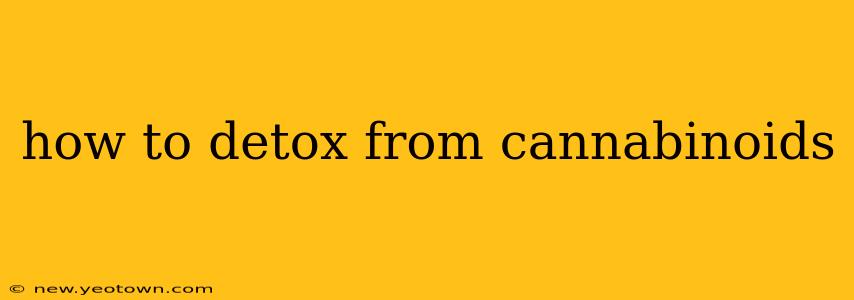The journey to a cannabinoid-free life can feel daunting, but with the right approach and understanding, it's entirely achievable. This isn't just about passing a drug test; it's about supporting your body's natural detoxification processes and addressing any potential lingering effects of cannabinoid use. My name is Alex, and as a health and wellness writer with years of experience researching natural detoxification methods, I'll guide you through a holistic approach.
This isn't a quick fix; it's a process requiring patience, self-compassion, and a commitment to healthy lifestyle choices. Remember, consulting a healthcare professional is crucial before undertaking any detoxification program, especially if you have pre-existing health conditions or are taking medications.
What are Cannabinoids and Why Detox?
Cannabinoids are chemical compounds found in cannabis plants, the most well-known being THC (tetrahydrocannabinol) and CBD (cannabidiol). While CBD is often touted for its potential health benefits, THC is psychoactive and can lead to dependence. Detoxing from cannabinoids is often pursued for various reasons, including:
- Drug testing: Many workplaces and situations require cannabinoid-free results.
- Health concerns: Some individuals experience negative health effects from prolonged use, such as anxiety, impaired memory, or respiratory issues.
- Personal goals: Many choose to detox to regain control over their habits and improve overall well-being.
How Long Does it Take to Detox from Cannabinoids?
How long does it take to detox from cannabinoids? This is a frequently asked question, and the answer depends on several factors:
- Frequency and amount of use: Regular, heavy use will require a longer detoxification period than occasional, light use.
- Individual metabolism: Metabolic rate significantly impacts how quickly the body processes and eliminates cannabinoids.
- Body fat percentage: Cannabinoids are fat-soluble, meaning they can store in body fat, prolonging the detoxification process.
- Hydration and nutrition: Proper hydration and a balanced diet support the liver and kidneys in their detoxification functions.
Generally, THC can be detectable in urine for up to 30 days, sometimes longer for heavy users. However, feeling the effects of cannabinoids may subside much sooner, depending on the individual.
What are the Symptoms of Cannabinoid Withdrawal?
What are the symptoms of cannabinoid withdrawal? Withdrawal symptoms vary greatly between individuals, but some common experiences include:
- Irritability and mood swings: Feeling agitated, anxious, or depressed is quite common.
- Sleep disturbances: Insomnia, vivid dreams, or difficulty staying asleep are frequently reported.
- Changes in appetite: Decreased appetite or increased cravings are possible.
- Headaches: These can range from mild to severe.
- Intense cravings: A strong urge to consume cannabis may persist.
It's important to address these symptoms with healthy coping mechanisms, like exercise, meditation, and stress-reduction techniques. Seeking support from friends, family, or a therapist can also be very beneficial.
How to Naturally Detox from Cannabinoids: Strategies & Tips
Successfully detoxing involves a multi-pronged approach focusing on supporting your body’s natural cleansing mechanisms. Here's a breakdown:
1. Hydration is Key
Drink plenty of water throughout the day to flush out toxins from your system. Aim for at least eight glasses of water daily, and consider adding electrolytes to replenish minerals lost through sweating.
2. Nourishing Your Body
Focus on a balanced diet rich in fruits, vegetables, and whole grains. These foods provide essential vitamins and minerals, supporting liver and kidney function. Limit processed foods, sugary drinks, and excessive caffeine, which can hinder detoxification.
3. Regular Exercise
Physical activity boosts metabolism and promotes detoxification. Aim for at least 30 minutes of moderate-intensity exercise most days of the week.
4. Prioritize Sleep
Sufficient sleep is crucial for the body's restorative processes. Aim for 7-9 hours of quality sleep each night.
5. Stress Management
Chronic stress can interfere with detoxification. Incorporate stress-reducing activities like yoga, meditation, or deep breathing exercises into your daily routine.
6. Consider Supplements (Consult a Doctor First!)
Some supplements, such as milk thistle (for liver support) and cranberry (for urinary tract health), are often discussed in relation to detoxification. However, always consult a healthcare professional before taking any supplements. They can advise on appropriate dosages and potential interactions with medications.
Seeking Professional Help
If you're struggling with cannabinoid withdrawal or addiction, seeking professional help is crucial. A healthcare professional can provide personalized guidance, support, and potentially refer you to resources like addiction treatment programs.
Remember, detoxification is a personal journey, and progress may vary. Be patient with yourself, celebrate your successes, and remember that support is available. A healthy lifestyle encompassing the strategies outlined above will significantly aid your body's natural detoxification process and overall well-being.

